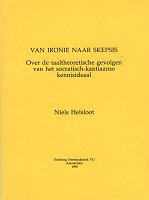 Roughly stated, conceptions of the language underlying our analyses and interpretations of 'things' are divisible into two categories. 'Analytic' approaches start from the premise that the language we dispose of is an insufficient basis to acquire knowledge or reach understanding. 'Hermeneutic' approaches, relying more on interpretion, rather conceive of the language given as the most direct, or even the only source of information we have.
Roughly stated, conceptions of the language underlying our analyses and interpretations of 'things' are divisible into two categories. 'Analytic' approaches start from the premise that the language we dispose of is an insufficient basis to acquire knowledge or reach understanding. 'Hermeneutic' approaches, relying more on interpretion, rather conceive of the language given as the most direct, or even the only source of information we have.
Both angles of incidence are mutually exclusive; yet, they agree about the way language should be problematized, viz. as a means to distinguish between true and false statements. From both points of view, the assumption that language contributes to understanding (and misunderstanding) is the fundamental presupposition giving linguistic research its pertinence. In both ways, linguistics is at the mercy of epistemology's whims.
This incorporation of theories of language has been widely supported at least since Socrates. Though Socrates ironically recognized that knowledge is never fully pure, this did not alter the fact that he was interested in language only in as far as it produces a distinction between truth and epistemologically improper affairs such as absurdity and insanity. Kant, in particular, did much to bring about the contemporary popularity of this distinction. Through him, the socratic ideal of knowledge still has its imperative effects on almost all modern theorizations of language.
In order to change this unsatisfactory state of affairs, I propose to stop looking for compromises between both solutions, and to contribute to a radical alternative: a theory of language that is skeptical about claims of knowledge.